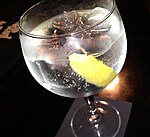
A cocktail is an alcoholic mixed drink. Most commonly, a cocktail is a combination of one or more spirits mixed with other ingredients, such as juices, flavored syrups, tonic water, shrubs, and bitters. Cocktails vary widely across regions of the world, and many websites publish both original recipes and their own interpretations of older and more famous cocktails.
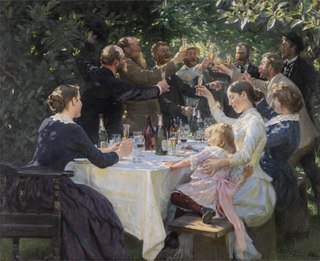
A party is a gathering of people who have been invited by a host for the purposes of socializing, conversation, recreation, or as part of a festival or other commemoration or celebration of a special occasion. A party will often feature food and beverages, and often conversation, music, dancing, or other forms of entertainment.

A wedding reception is a party usually held after the completion of a marriage ceremony as hospitality for those who have attended the wedding, hence the name reception: the couple receive society, in the form of family and friends, for the first time as a married couple. Hosts provide their choice of food and drink, although a wedding cake is popular.
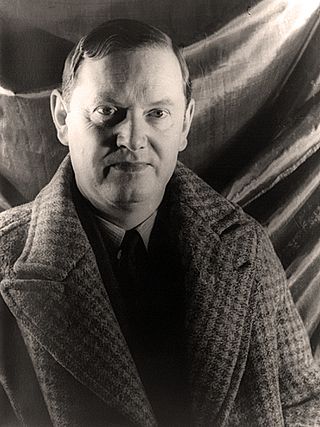
Arthur Evelyn St. John Waugh was an English writer of novels, biographies, and travel books; he was also a prolific journalist and book reviewer. His most famous works include the early satires Decline and Fall (1928) and A Handful of Dust (1934), the novel Brideshead Revisited (1945), and the Second World War trilogy Sword of Honour (1952–1961). He is recognised as one of the great prose stylists of the English language in the 20th century.
Dinner usually refers to what is in many Western cultures the biggest and most formal meal of the day. Historically, the largest meal used to be eaten around midday, and called dinner. Especially among the elite, it gradually migrated to later in the day over the 16th to 19th centuries. The word has different meanings depending on culture, and may mean a meal of any size eaten at any time of day. In particular, it is still sometimes used for a meal at noon or in the early afternoon on special occasions, such as a Christmas dinner. In hot climates, the main meal is more likely to be eaten in the evening, after the temperature has fallen.

Mrs. Dalloway is a novel by Virginia Woolf published on 14 May 1925. It details a day in the life of Clarissa Dalloway, a fictional upper-class woman in post-First World War England. It is one of Woolf's best-known novels.

A groomsman or usher is one of the male attendants to the groom in a wedding ceremony. Usually, the groom selects close friends and relatives to serve as groomsmen, and it is considered an honor to be selected. From his groomsmen, the groom usually chooses one to serve as best man.

Three Act Tragedy is a work of detective fiction by British writer Agatha Christie, first published in the United States by Dodd, Mead and Company in 1934 under the title Murder in Three Acts and in the UK by the Collins Crime Club in January 1935 under Christie's original title. The US edition retailed at $2.00 and the UK edition at seven shillings and sixpence (7/6).

Finger foods are small, individual portions of food that are eaten out of hand. They are often served at social events. The ideal finger food usually does not create any mess, but this criterion is often overlooked in order to include foods like tacos. One origin for finger foods is the French canapé.

Julia Faye Maloney, known professionally as Julia Faye, was an American actress of silent and sound films. She was known for her appearances in more than 30 Cecil B. DeMille productions. Her various roles ranged from maids and ingénues to vamps and queens.

Josephine Hutchinson was an American actress. She acted in dozens of theater plays and dozens of films, including Son of Frankenstein and North by Northwest, as well as numerous television appearances as guest star in various series including The Twilight Zone.

The Temple at Thatch was an unpublished novel by the British author Evelyn Waugh, his first adult attempt at full-length fiction. He began writing it in 1924 at the end of his final year as an undergraduate at Hertford College, Oxford, and continued to work on it intermittently in the following 12 months. After his friend Harold Acton commented unfavourably on the draft in June 1925, Waugh burned the manuscript. In a fit of despondency from this and other personal disappointments he began a suicide attempt before experiencing what he termed "a sharp return to good sense".

Meier and Comfort was a real estate development firm active in the 1920s in the St. Louis suburbs of Clayton and Ladue, Missouri, United States. The firm was the first to develop private place neighborhoods in Ladue, and their work was influential in establishing the architectural character of the city.
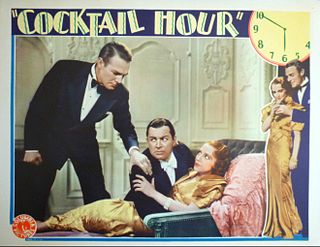
Cocktail Hour is a 1933 American pre-Code romantic drama film produced and distributed by Columbia Pictures and starring Bebe Daniels. This film was directed by Victor Schertzinger.
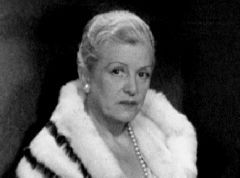
Florence Wix was an English-born American character actress who worked from the 1920s in silent films through sound films of the 1950s.

The Tailteann Games or Aonach Tailteann was an Irish sporting and cultural festival held in the Irish Free State in 1924, 1928, and 1932. It was intended as a modern revival of the Tailteann Games held from legendary times until the Norman invasion of Ireland; as such it drew inspiration from the Modern Olympics revival of the Ancient Olympics. Croke Park, the Dublin headquarters of the Gaelic Athletic Association, was the venue for the opening ceremony and many of the sports events, which were open to people of Irish birth or ancestry. The Tailteann Games were held shortly after the Summer Olympics, such that athletes participating in Paris 1924 and Amsterdam 1928 came to compete. Participants coming from England, Scotland, Wales, Canada, the USA, South Africa and Australia as well as Ireland. Chess competitions were held in conjunction with the Irish Chess Union as part of the Tailteann Games. There were also artistic competitions and industrial displays. The games became regarded as a Cumann na nGaedheal project, and when that party lost power to Fianna Fáil after the 1932 election there was no financial backing for further games.

Evelyn Florence Margaret Winifred Gardner was the youngest child of Herbert Gardner, 1st Baron Burghclere, and the first wife of Evelyn Waugh. She was one of the Bright Young Things.
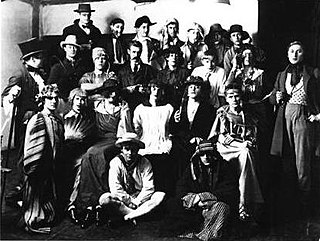
The Hypocrites' Club was one of the student clubs at Oxford University in England. Its motto in Greek, from an Olympian Ode by Pindar, was Water is best. This led to the members being called Hypocrites, due to the fact that beer, wine and spirits were the chosen drinks.

Charlie McCarthy, Detective is a 1939 American comedy film starring Edgar Bergen, Charlie McCarthy and Robert Cummings.



















